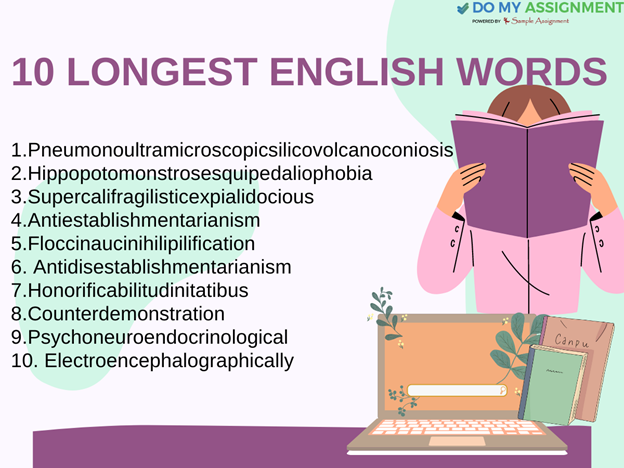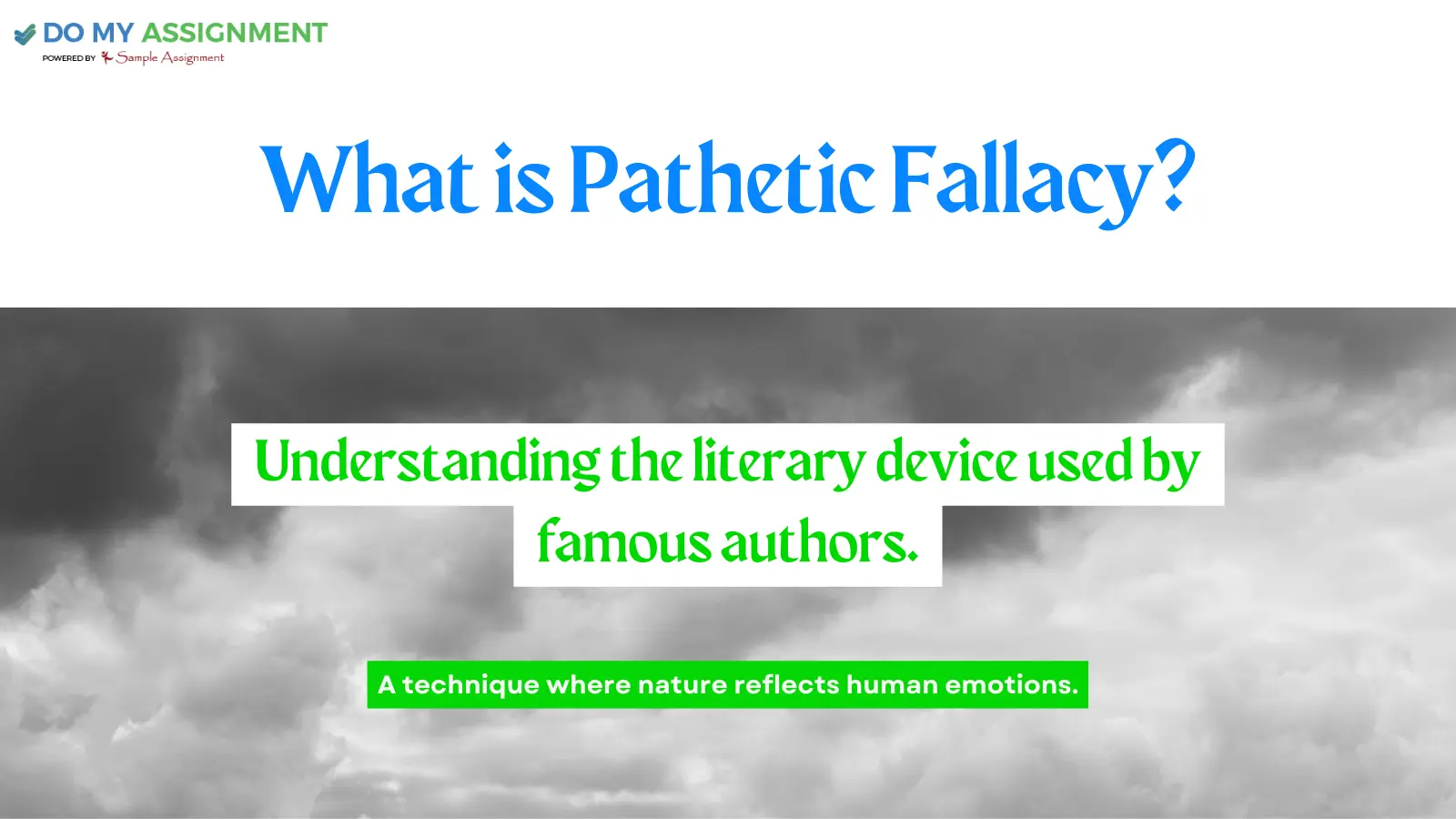Top 10 Longest English Words: Journey into Word Wonderland

There are countless mesmerizing terms in the fascinating language of English. Some of these words are quite lengthy and might be difficult to pronounce. In order to make them simpler to grasp, we shall study the 10 longest English words in this blog to help you understand these words without any hurdles. Let's start our journey into the realm of lengthy sentences! Learn the Anatomy, Origin, and Usage of each word under the guidance of Do My Assignment experts. Now let's dig into how these experts explain the Anatomy, Origin, and Usage of each word.
Learn the Anatomy, Origin, and Usage of each word
Have a glimpse of the listed 10 Longest English Words, and simply you’re understanding.
1. Pneumonoultramicroscopicsilicovolcanoconiosis (45 letters)
This word is famous for being one of the longest words in English. But what does it mean? Well, it's a lung disease that people can get from breathing in tiny dust. This dust is often found near volcanoes. It's so long that most people just call it "silicosis" to keep things simple.
Anatomy:
- Root words: Pneumono (lung), ultra (beyond), micro (small), silico (silica), volcano, conio (dust), and -osis (condition or disease).
- Components: This word combines various prefixes, root words, and suffixes to describe a lung disease caused by inhaling fine silica dust, typically found near volcanoes.
Origin:
- The term was coined humorously and is often cited as one of the longest words in the English language.
- Its origin is traced back to the early 20th century when people playfully created this word to describe a very specific medical condition.
Usage:
While impressive due to its length, this word is seldom used in medical practice. Instead, the more concise term "silicosis" is commonly employed to describe this lung ailment.
2. Hippopotomonstrosesquipedaliophobia (33 letters)
Now, this word is a bit funny. It means being afraid of long words, which is kind of ironic because the word itself is so long! People with this fear might feel uncomfortable when they see or hear long words.
Anatomy:
- Root words: Hippo (horse), potomo (river), monstr (monstrous), sesqui (one and a half), and ped (foot).
- Components: This word is a humorous amalgamation of root words and affixes intended to describe the fear of long words, making it somewhat ironic.
Origin:
- The word is a playful creation and doesn't have a formal medical or psychological basis.
- It highlights the whimsical side of English, where long words are used to describe a fear of long words.
Usage:
- This word is more of a linguistic joke than a clinically remembered term.
- This word generally reminds us that English can be both playful and complex, with deliberately ironic words.
3. Supercalifragilisticexpialidocious (34 letters)
This word seems to be familiar to one who has seen the film "Mary Poppins”. “This term is made up of the words spectacular or amazing meaning. Moreover, this can be silly as well as enjoyable, which demonstrates how innovative English can be.
Anatomy:
- The term became popular with the movie named "Mary Poppins"
- This is generally made with the combination of words and sounds in a fanciful, playful word without a clear medical or official definition.
Origin:
- The term was created in regard to the 1964 Disney film called as” Mary Poppins."
- Its invention demonstrates vocabulary ability for imagination and the fun of word design.
Usage:
- It's used to talk about remarkable or spectacular things.
- Although it is not included in official dictionaries, it has grown to be a valued aspect of popular culture.
4. Antiestablishmentarianism (28 letters)
This term has to do with politics. It denotes a commitment to challenging conventional norms or modes of operation. When people began to demand changes in how things were done, particularly those involving the Church, in the 19th century, it started to become significant.
Anatomy:
- Root words: Anti (against), establish, and -ism (belief or ideology).
- Components: This word combines root words and a suffix to describe a political ideology opposing established institutions or the status quo.
Origin:
- The phrase was first used in the 19th century in relation to criticism of the Church of England's rule.
- It captures the social and political turbulence of the time when individuals questioned conventional wisdom.
Usage:
- The phrase is employed in talks of social and political transformation.
- It draws attention to how complicated the discussions are about enduring institutions.
5. Floccinaucinihilipilification (29 letters)
When someone believes something is completely unimportant and hence useless, they use this term. Despite not being a topic of conversation in casual settings, it is brought up in more serious conversations about philosophy and how we value certain things.
Anatomy:
- Root words: Flocci, nauci, nihil, and pilifi, derived from Latin words meaning "of little or no value."
- Components: Combining these base words creates a longer term that expresses the act of thinking something is worthless or unimportant.
Origin:
- The 18th century saw the invention of the phrase.
- It showcases English's passion for crafting intricate words with precise meanings.
Usage:
- It highlights the depreciation of something in arguments that are more academic or philosophical.
- Despite being lengthy, it has a specific function in language.
6. Antidisestablishmentarianism (28 letters)
The terms that we just discussed and this one are connected. In terms of religion, in particular, it's about defending existing institutions. This term represents a notion held by certain individuals that religion and government need to work closely together.
Anatomy:
- Root words: Anti (against), establish, and -ism (belief or ideology).
- Components: Similar to "antiestablishmentarianism," this word combines root words and a suffix to describe an ideology supporting established institutions, especially in the context of religion.
Origin:
- Like "antiestablishmentarianism," it also emerged in the 19th century as a response to debates about the separation of church and state.
- It represents a perspective favoring the continued connection of religion and government.
Usage:
- This word is employed in discussions about the role of religion in government and institutions.
- It acts as a companion to "antiestablishmentarianism."
7. Honorificabilitudinitatibus (27 letters)
When we talk about these, this word is used by the famous writer William Shakespeare in his play. It is also a playful word whose exact meaning is not yet clear, but it is basically related to being able to receive honors or awards.
Anatomy:
Root words : Honorificabilitudin: This is the main stem of the word. It appears to be derived from the Latin word "honorificabilitudo," which means "the state of being able to receive honors" or "capable of being honored." The stem is then extended with various suffixes to create the longer word.-itatibus. This is a suffix added to the stem. It doesn't have a clear meaning in itself but contributes to the length and complexity of the word.
Origin:
- This term was coined by Shakespeare, who used it to showcase his linguistic prowess.
- It originated in the late 16 century
Usage:
- The word is primarily of historical and literary interest.
- It's an example of Shakespeare's wordplay and creativity.
8. Counterdemonstration (18 letters)
This word is a bit shorter than the others on our list. It's used when people protest against another protest. So, if one group of people is demonstrating for something, another group might have a counterdemonstration to show they disagree.
Anatomy:
- Root words: Counter (against), demonstrate.
- Components: This term combines two root words to signify a protest or demonstration as opposed to another protest or demonstration.
Origin:
- The term has a brief and uncomplicated history.
- It illustrates the necessity for words to characterise conflicting activities in political and social circumstances.
Usage:
- It comes up in talks about protests and demonstrations nowadays.
- Despite its length, the term is basic and useful.
9. Psychoneuroendocrinological (27 letters)
This medical term carries a lot of weight. It involves researching the interactions between our bodies' brains, nerves, and hormones. Medical professionals and researchers use this term to describe intricate topics pertaining to our bodies and how they work.
Anatomy:
- Root words: Psycho (mind), neuro (nerves), endocrino (hormones), and -logical (related to the study of).
- Components: This term refers to the study of the interactions between psychological processes and the neurological and endocrine systems. It comprises root terms and a suffix.
Origin:
- The term has roots in endocrinology, neurology, and psychology.
- It symbolises the intricate connections that exist between different systems in the human body.
Usage:
- It is used to explore the complicated relationships between the mind, nerves, and hormones in scientific and medical situations.
- It is an accurate phrase for technical conversations while being long.
10. Electroencephalographically (27 letters)
Lastly, this word is also from the world of medicine. It's about studying the electrical activity in our brains using a special machine called an electroencephalogram (EEG). It allows doctors to understand what's occurring in our brains when solving health problems.
Anatomy:
- Root words: Electro (related to electricity), encephalo (brain), and -graphically (related to recording).
- Components: This word combines root words and a suffix to describe the process of recording electrical activity in the brain using an electroencephalogram (EEG).
Origin:
- It is a term used in the study of medicine.
- It illustrates the methods and tools needed to comprehend how the brain works.
Usage:
In conversations about brain monitoring and research, in particular, it is utilised in medical contexts.
Conclusion
So, there you have it, the 10 longest English words explained in simple language. While these words might seem super long and tricky, they're just like any other English word. They have meanings and purposes; sometimes, they're funny or playful.
Even though we might not use these words daily, they remind us that English is full of surprises and quirks. So, don't be intimidated the next time you come across a really long word. Take a moment to break it down, connect with “Do My Assignment”, and uncover knowledge regarding these words. Furthermore, English is an ever-evolving language; these long words are a testament to its richness and diversity.
If you ever get stuck with any English assignment and require assignment help feel free to contact us.
Nick Johnson
Nick is a multi-faceted individual with diverse interests. I love teaching young students through coaching or writing who always gathered praise for a sharp calculative mind. I own a positive outlook towards life and also give motivational speeches for young kids and college students.









